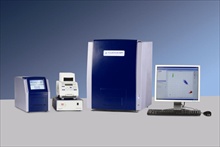Channels
Special Offers & Promotions
Fluidigm technology used to validate new risk loci for Graves disease
 Fluidigm Corporation has announced that Rujin Hospital in
Shanghai, China has used the company's integrated fluidic circuits (IFCs) to
help validate two new susceptibility loci for Graves' disease. Researchers
applied the unique properties of the Fluidigm 96.96 Dynamic ArrayTM IFC and the
EP1TM System to re-genotype selected SNPs for the replication study.
Fluidigm Corporation has announced that Rujin Hospital in
Shanghai, China has used the company's integrated fluidic circuits (IFCs) to
help validate two new susceptibility loci for Graves' disease. Researchers
applied the unique properties of the Fluidigm 96.96 Dynamic ArrayTM IFC and the
EP1TM System to re-genotype selected SNPs for the replication study. In a paper entitled A genome-wide association study identifies two new risk loci for Graves' disease, published in the August 14, 2011 issue of Nature Genetics Magazine, researchers confirmed four previously reported loci and identified two new susceptibility loci for Graves' disease. Graves' disease is a common autoimmune disorder characterized by thyroid stimulating hormone receptor autoantibodies and hyperthyroidism.
To investigate the genetic architecture of Graves' disease, Rujin Hospital researchers conducted a genome-wide association study in 1,536 individuals with Graves' disease (cases) and 1,516 controls. They further evaluated a group of associated SNPs in a second set of 3,994 cases and 3,510 controls. All samples were recruited from the Chinese Han population through collaboration with hospitals in China.
"The Fluidigm EP1 microfluidic genetic analysis system proved to be a powerful tool for SNP genotyping validation research in our GWAS project," noted Dr. Chun-Ming Pan of the State Key Laboratory of Medical Genomics, Ruijin Hospital, Shanghai Jiaotong University School of Medicine. "The EP1 enabled us to easily set up 9,216 PCR experiments at a time without using a robot. Within four hours we acquired almost 10,000 data points with outstanding reproducibility and accuracy. The nanoliter-level reaction chambers of Fluidigm chips resulted in significant cost savings, as we needed to only use minute amounts of the expensive SNP genotyping reagents. For us, the EP1 is an ideal platform for our GWAS research," concluded Dr. Pan.
"There is world-class science being conducted in China and Rujin Hospital's important work in Graves' disease research is a great example of it," said Gajus Worthington, Fluidigm president and chief executive officer. "Fluidigm is proud to have contributed to their discoveries through the use of our genotyping systems, and there is more to come. We now have more than a dozen systems in use within China, at some of the country's leading research laboratories. We believe this is just the beginning and that our technology can play a significant and broad role in enabling China's life science researchers."
GWAS was performed on a microarray system at the Chinese National Human Genome Center in Shanghai, China. In stage 2, 100 SNPs were selected for the replication study. Among them, 96 SNPs were genotyped using TaqManTM SNP Genotyping Assays using the Fluidigm 96.96 Dynamic Array IFC and EP1 platform.
Fluidigm (NASDAQ: FLDM) develops, manufactures and markets microfluidic systems for growth markets in the life science and agricultural biotechnology, or Ag-Bio, industries. Fluidigm's proprietary microfluidic systems consist of instruments and consumables, including integrated fluidic circuits, or chips, and reagents. These systems are designed to significantly simplify experimental workflow, increase throughput and reduce costs, while providing the excellent data quality demanded by customers. Fluidigm actively markets three microfluidic systems including nine different commercial chips to leading pharmaceutical and biotechnology companies, academic institutions and Ag-Bio companies. For more information, please visit www.fluidigm.com.
* "Fluidigm," the Fluidigm logo, EP1 and Dynamic Array are trademarks or registered trademarks of Fluidigm.
Media Partners


